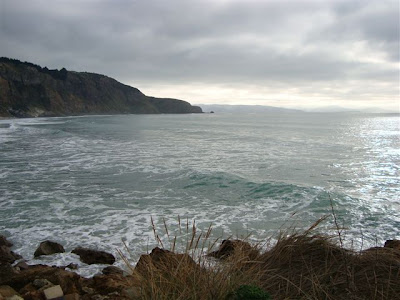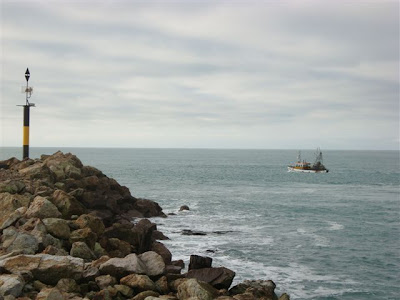Every morning as I drive to work, I turn on the stereo to listen to the next instalment in whichever epic I’m sampling at present. You have to be quick to get them. They don’t tend to stay in stock for very long, even in the online bookshops.
So far this year it’s been Virgil’s
Aeneid, then Dante, and now
Beowulf and the
Epic of Gilgamesh. After that I think I might go back to Homer, then right through the whole cycle again.
Listening to so much epic poetry gets one to thinking about the nature of plots, and of storytelling in general. There’s something, too, in the episodic nature of these twenty-minute trips to the office which encourages a sense of incremental repetition.
Is it the poems themselves, or is it the translations which make them all seem so
similar – so preoccupied with big issues: the meaning of life, the tragic inevitability of conflict, the necessity of leaving an enduring name?
It’s a little disturbing that different versions of the same epic can leave one with such different impressions. E. V. Rieu’s translation of the
Odyssey (for instance) gave me a powerful sense of the sea: the treacherous complexities of its tides and currents. I felt very strongly that the man who wrote that description of Odysseus swimming along the shore of Phaeacia must have been there himself – must have been a sailor or even an ocean swimmer.
Not so when I heard the same passage in Ian McKellen’s reading of Robert Fagles’ verse translation. The emphasis seemed now (understandably) to be fixed firmly on the beauty of the young Nausicäa.
Gene Wolfe is one of my favourite Science Fiction writers – and that’s saying something. I was an almost obsessive consumer of SF when I was younger: the big three – Clarke, Asimov, Heinlein – were succeeded by the English invasion – John Wyndham, John Christopher, Brian Aldiss – then the Eastern Bloc – Stanislaw Lem, Tarkovsky, the Strugatsky brothers – then the postmoderns – Philip K. Dick, J. G. Ballard, Ursula K. Le Guin ...
Wolfe has stiff competition, then. But there’s something in him which isn’t in the others. How can I put it? He’s less afraid to fail. His books are wildly uneven: ranging from the barbaric, atmospheric genius of
Shadow of the Torturer and its sequels (called collectively
The Book of the New Sun) to the jaunty ventriloquism of
Pandora, by Holly Hollander.
My favourite series of his (and he specialises in sets of linked novels) is the one comprising
Soldier in the Mist (1986) and
Soldier of Arete (1989), recently completed by
Soldier of Sidon (2006). Is it Science Fiction at all? More like historical fantasy, I suppose. Ostensibly this set of narratives tracks the wanderings of a brain-damaged Roman mercenary at the time of the Persian invasion of Greece.
The nature of Latro, or Lucas, or Lucius’s injury is a partial amnesia which makes him forget the events of the preceding day every time he falls asleep. Each day, then, is a new beginning for him. As in the film
Memento, his friends (and enemies) have to reintroduce themselves every time they meet. His views of them shift from day to day.
The conceit of the books is that he is forced to write down as much as possible of each day’s events on a papyrus scroll, which he then reads over next morning. Inevitably, though, he fails to recognise the meaning of much of what he has witnessed – a great deal slips between the gaps. And then there are the periods of weeks or months at a time when he is unable to use the scroll and thus, as it were, awakens in a wholly unfamiliar environment, surrounded by strangers with whom he is, apparently, intimate.
Another peculiarity of Latro’s state is his ability to see gods and spirits and to converse with them. As far as he’s concerned, they’re just people – though sometimes they’re considerate enough to identify themselves as supernatural.
The books are sensual, violent, episodic – by their very nature – but Wolfe uses this basic idea to build up a sense of anticipation and suspense. Will Latro escape? Recover his memory? Return home?
In the end, it doesn’t really make any difference. As long as his memory is impaired (and the implication is strong that Latro can never be cured), he can
never actually succeed in recovering a sense of individuality or personal space.
•
 Aran Ashe: Choosing Lovers for Justine (1993)
Aran Ashe: Choosing Lovers for Justine (1993)
My third exhibit is admittedly far less glamorous but (I would argue) no less suggestive.
Aran Ashe is a (pseudonymous) erotic writer published by Nexus Books, published by Nexus, a British imprint of Virgin Books, specialising in sado-masochistic pornography for straight male readers (hence the gender-ambiguity of the author's name?). S/he concocts stories of female submission in a fantasy universe involving spanking, piercing, and erotic lactation, among other things.
Ashe’s books range from pseudo-Edwardian masochistic bisexual erotica (
Choosing Lovers for Justine, 1993) to two episodic series (
The Chronicles of Lidir, 4 titles: 1991-1992, and The
Chronicles of Tormunil, ongoing – 5 volumes to date: 1995-2008) set in a vaguely mythological fantastic Otherwhere.
There’s an awful similarity about pornographic novels. No significant character development is really possible for characters whose principal function is to have sex with one another. The corruption of innocence is therefore the most obvious and predominant theme: there is at least some interest in the concept of an ingénu/e overcoming his or her initial distrust and fear of sensuality.
After that, though, there’s little to be done except introducing new exclamations of rapture or new sets of characters – a process amusingly parodied in Edward Gorey’s
The Curious Sofa (1961).
The supernatural is virtually the only realm of existence which can be conveniently juxtaposed with the pornographic. Humour and satire tend to undercut the action which is its selling point. Politics, history, simply complicate the plotlines without significantly altering them. The presence of ghosts or demons does however at least have the effect of calling into question the eschatological implications of a life of sensual self-indulgence.
And that’s why the works of Aran Ashe stands out from this morass of stale and compulsive repetitive action. His / her interests are (on the strength of her fiction, at any rate) genuinely unusual.
Take, for example, the following fairly characteristic passage from
The Handmaidens (1995), the first volume in Ashe’s "Chronicles of Tormunil":
Quislan spoke to Sutrice of a special place inside a man, saying that when the man became sufficiently aroused, without relief, this place would become swollen and distended. Sutrice put her fingers in Josef and found it. ‘I have some metal tongs, she said, ‘that we could use to squeeze it.’
His wrists were fastened to a bar that ran below the ceiling. The jaws of the tongs were shaped. She put them up inside him. When she squeezed gently, he moaned, his penis leaked. She took out the tongs and slipped her fingers in. He felt the inner swelling move under the pressure of her fingers. Between his legs, his balls were bursting. Sutrice rubbed the place inside him and his yield increased to an oily runnel down his stem. And again he felt it move – the living growth inside him, like a slowly squirming creature under his fingers. The gland ached to empty – he felt its first involuntary pulse. Very gently, Sutrice took out her fingers and lapped up his leakage. The tip of her tongue against the base of his penis almost precipitated his climax. Then she applied the firm thumb pressure that took his erection down.
The whole exercise had been one of exquisite agony for Josef. But it was not over. [217]
That’s putting it mildly. It certainly
isn't over. The description of Josef's ordeal goes on for pages and pages, until the end of the chapter brings his sufferings to an end.
Ashe’s first series of novels,
The Chronicles of Lidir: A Saga of Erotic Domination delineate the kingdom of Lidir, a fantasyland dedicated to bondage, teasing, bodily manipulation and torture.
Then came
The Chronicles of Tormunil, beginning in 1995 and still unresolved in the latest volume,
Leah’s Punishment (2008). His/her concerns, on display here even more obsessively than in "Lidir", include spanking, piercing and erotic lactation.
Further research reveals the interesting fact that Ashe also writes as "Valentina Cilescu." Cilescu, author of the bestselling "Mara Vampire" series of erotic titles, also has a number of other pseudonyms, including Anastasia Dubois, Sophie Danson, Louise Aragon, Sue Lightfoot, Sue Dyson, Aurelia Clifford and Zoë Barnes.
The Mara Vampire series (so far) comprises
Kiss of Death (1992) - listed below - as well as
The Phallus of Osiris (1993),
Empire of Lust (1994),
Masque of Flesh (1995),
Vixens of Night (1997) and
Lusts of the Forbidden (1999). Great titles, wouldn't you say?
Valentina Cilescu ['Aran Ashe']
- Ashe, Aran. The Slave of Lidir. The Chronicles of Lidir: A Saga of Erotic Domination, 1. A Nexus Book. London: W. H. Allen, 1991.
- Ashe, Aran. The Dungeons of Lidir. The Chronicles of Lidir: A Saga of Erotic Domination, 2. A Nexus Book. 1991. London: W. H. Allen, 1994.
- Ashe, Aran. The Forest of Bondage. The Chronicles of Lidir: A Saga of Erotic Domination, 3. A Nexus Book. London: W. H. Allen, 1991.
- Ashe, Aran. Pleasure Island. The Chronicles of Lidir: A Saga of Erotic Domination, 4. 1992. A Nexus Classic. London: W. H. Allen, 2001.
- [Ashe, Aran. The Chronicles of Lidir. A Saga of Erotic Domination, 4: Pleasure Island. London: Nexus, 1992.]
- Ashe, Aran. Choosing Lovers for Justine. A Nexus Book. 1993. London: W. H. Allen, 1995.
- Ashe, Aran. The Handmaidens. The Chronicles of Tormunil, 1. A Nexus Book. London: W. H. Allen, 1995.
- Ashe, Aran. Citadel of Servitude. The Chronicles of Tormunil, 2. 1997. A Nexus Classic. London: W. H. Allen, 1999.
- Ashe, Aran. Slave-Mines of Tormunil. The Chronicles of Tormunil, 3. A Nexus Book. London: W. H. Allen, 2002.
- Ashe, Aran. Love-Chattel of Tormunil. The Chronicles of Tormunil, 4. A Nexus Book. London: W. H. Allen, 2003.
- Ashe, Aran. Leah’s Punishment. The Chronicles of Tormunil, 5. A Nexus Book. London: W. H. Allen, 2008.
- Cilescu, Valentina. Kiss of Death. London: Headline, 1992.
So what exact point am I trying to make with this juxtaposition of two writers from two pulp genres (one, admittedly, now admitted to Academic respectability under the rubric SF: Speculative Fiction; the other probably permanently beyond the pale) with those heroes of Western narrative, the great masters of the epic?
Well, I guess on the one hand I want to question the image of a story as necessarily having to gratify our desire for completion or closure. Long-running TV series do that already, of course: both the ones where time never seems to move forward, however many episodes unfold, and those where the characters are permitted to age and evolve.
Freud's idea of repetition-compulsion: the
fort-da game he explored in
Beyond the Pleasure Principle is the obvious precedent to invoke here. What pleasure, exactly, can be expected to reside in the essentially incidentless books of Aran Ashe, where the psychopathology of suspense, of delayed gratification has become a kind of humdrum normality?
Should we regard "Valentina Cilescu" (in any of her avatars) as a satirist of the banality of male passion? Or simply a competent worker-bee, laying out stories at so much the yard (pun intended)? There's something uniquely
strange (at least in my experience) in the purity and precision of her prose which seems to make them something more than the usual masturbatory fantasies.
Is it the essential benignity of her vision of a world devoted solely to sensual gratification, both the aggressors'
and the victims'? Is it the affectless, almost scientific dispassion of her writing? There are no philosophical profundities to be found in the soliloquies of her various protagonists (one hesitates to call them "characters," exactly). She's no de Sade, no theorist of the consequences of the worship of Nature and "natural" processes, when carried to extremes ...
What her books do (to me) seem to represent is a kind of
reductio ad absurdum of the whole notion of storytelling. They're not stories
about anything, though they do, admittedly, contain incidents and names of people they happen to. Their popularity, in any case, resides elsewhere - in pure stimulation of recondite, very specific areas of human appetite.
She does it well, in that she
writes well, but how could she be said to do it badly? If her books failed to sell, it would be, presumably, because they failed to satisfy this pre-existing need for certain types of fantasy. In that sense, we would have to call them purely atmospheric, more like
music than more conventional forms of tale-spinning.
I hope, by now, that the relation of Aran Ashe's
oeuvre to Gene Wolfe is beginning to come more into focus. His character, Latro, is in perpetual doubt as to the nature of the experiences he records. The reader, wiser and more memorious (to use Borges' term) than he can possibly be, is able to piece together a good deal of the picture he doesn't see.
But not all of it. Not
nearly all of it. Gene Wolfe's specialty as a writer is to draw you into mazes of complex action which fail ever to resolve. Instead, new complexities, new areas of amnesiac exclusion constantly come into view, until the end of the particular story, or book, or book within a series, or even series itself, is nothing more than an invitation to return to the beginning.
Only to be disappointed again. His stories refuse to regulate themselves into stable plots however many times they are read, though each new experience of them offers new details and new levels of complexity. They defeat any stable sense of causation (presumably - though not
certainly - as a side-product of Wolfe's own view of an unstable and perpetually mysterious universe). They're the opposite of metafiction - more like fiction as somnambulism.
Wolfe is, in my opinion, a great writer. Aran Ashe most certainly is not. But in many ways her stories could be said to be even more original, more disconcertingly self-questioning than his. Her style is purer, more concentrated - his (at times) irritatingly offhand and ill-assembled. Both of them, however, share this quality of almost
seeming to aspire to automatic writing.
Could either of them be said to hold a candle to Virgil, or Homer, or Dante? Of course not. The interest of
those stories demonstrably transcends any shifts in literary fashion (or critical temperature).
Borges had a point, though, when he said that subsequent writers could alter the way we read their predecessors, that influence could work
backwards as well as forwards, that parts of Browning did not read the same after one had experienced Kafka, even that Pope's translation could be said to effect the text of Homer.
I don't think I can read those epics the same way now that I've started to question the Aristotelean poetics of narrative they allegedly embody. The unquestioned borrowings of material and incident from epic poet from epic poet, of Virgil from Homer, or Dante from Lucan and Ovid as well as Virgil, have shifted their character for me now that I'm thinking of them in terms of Wolfe and Ashe.
None of these texts, after all, resolve themselves - their choice of an area of time to focus upon looks more and more arbitrary the more one considers it. The
Odyssey goes on at least a book further than conventional "retellings" admit, and even then it isn't finished, Virgil himself left his poem unfinished, and begged on his deathbed for its destruction. Dante (allegedly) had to appear in a dream to one of his sons to point out the closet where he'd walled up the last cantos of the
Commedia ...
All these examples seem to me to delineate our need for a poetics of repetition-compulsion, a way of accounting for the existence of texts such as Wolfe's dramas of amnesia and post-hypnotic states, or Aran Ashe's version of Nietzsche's eternal return - sleepwalking through stories as we do (at times) through life.





















































